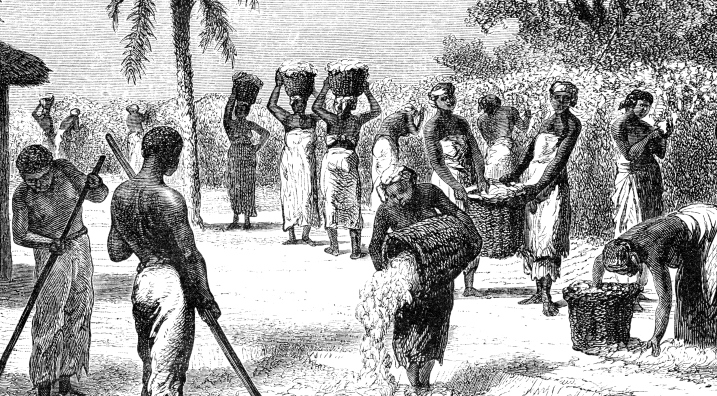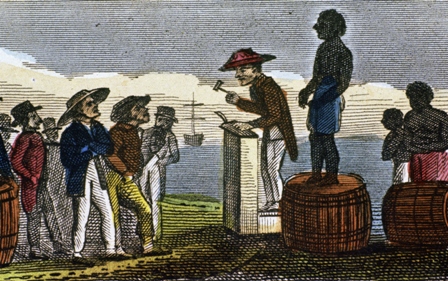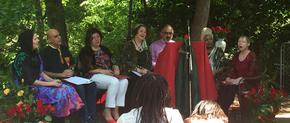The views expressed in our content reflect individual perspectives and do not represent the authoritative views of the Baha'i Faith.
 Born in the era of slavery, the Baha’i Faith became the first of the world’s religions to prohibit the terrible practice of owning human beings. In the middle of the 19th Century, Baha’u’llah wrote:
Born in the era of slavery, the Baha’i Faith became the first of the world’s religions to prohibit the terrible practice of owning human beings. In the middle of the 19th Century, Baha’u’llah wrote:
We have… forbidden the trading in slaves, both men and women. This, verily, is what God hath enjoined in this wondrous Revelation. – The Summons of the Lord of Hosts, p. 89.
 When that Baha’i law emerged from Baha’u’llah’s pen, the Atlantic slave trade still operated. The slaves, mostly tribal peoples who came from the central and western portions of Africa, sold by Africans to European slave traders – were then transported by slave ship to both North and South America, a harrowing, deadly experience collectively now called the Middle Passage. Prominent slave traders — the Portuguese, the Dutch, the British, the French, the Spanish and the Americans — shipped more than 12 million African people across the Atlantic between the 16th and 19th centuries, a period some scholars now call the African Holocaust. But slaves didn’t just come from Africa. Uncounted millions more, both slaves and indentured servants called Coolies, came across the Pacific from Asia during that same period.
When that Baha’i law emerged from Baha’u’llah’s pen, the Atlantic slave trade still operated. The slaves, mostly tribal peoples who came from the central and western portions of Africa, sold by Africans to European slave traders – were then transported by slave ship to both North and South America, a harrowing, deadly experience collectively now called the Middle Passage. Prominent slave traders — the Portuguese, the Dutch, the British, the French, the Spanish and the Americans — shipped more than 12 million African people across the Atlantic between the 16th and 19th centuries, a period some scholars now call the African Holocaust. But slaves didn’t just come from Africa. Uncounted millions more, both slaves and indentured servants called Coolies, came across the Pacific from Asia during that same period.
In fact, ancient human history is replete with slavery. The Egyptians, the Romans, the Greeks and just about every other dominant culture owned and traded in slaves. Priests, planters and profiteers enslaved Native Americans, and some Native American tribes even took captives from other tribes and enslaved them. Of course, slavery by many other names still exists in various places around the world today.
Most of us in the modern world think of slavery as an historical artifact, a remnant of the past. But the United Nations estimates somewhere between 27-30 million people are enslaved today. In fact, some scholars say more slaves exist now than at any other time in human history. They are:
- forced, bonded and indentured laborers – economic slaves who toil to lift impossible burdens of “loans”, who work because of intimidation or violence or who belong to social classes and castes expected to pay off ancestral debts through lifetimes of hard labor.
- the young — child laborers, domestic workers, child soldiers and children sold to work in the cotton, cocoa or fishing industries in the developing world.
- victims of human trafficking, often abducted and forced into prostitution, most of whom are women, many of them minors and children.
- And they are literally millions of young girls exploited by forced and early marriage, who often become victims of verbal, physical, emotional and sexual abuse
 How do we address this deep and seemingly intractable issue? Ultimately, slavery comes from poverty. In the parts of the world without robust economies, where education and a civil society do not function well, slavery can flourish. The Baha’i teachings say the solution to these economic causes of slavery will come from the elimination of the extremes of poverty and wealth – one of the central principles of Baha’u’llah’s Faith:
How do we address this deep and seemingly intractable issue? Ultimately, slavery comes from poverty. In the parts of the world without robust economies, where education and a civil society do not function well, slavery can flourish. The Baha’i teachings say the solution to these economic causes of slavery will come from the elimination of the extremes of poverty and wealth – one of the central principles of Baha’u’llah’s Faith:
The fundamentals of the whole economic condition are divine in nature and are associated with the world of the heart and spirit. This is fully explained in the Bahá’í teaching, and without knowledge of its principles no improvement in the economic state can be realized. The Bahá’ís will bring about this improvement and betterment but not through sedition and appeal to physical force — not through warfare, but welfare. Hearts must be so cemented together, love must become so dominant that the rich shall most willingly extend assistance to the poor and take steps to establish these economic adjustments permanently. If it is accomplished in this way, it will be most praiseworthy because then it will be for the sake of God and in the pathway of His service. For example, it will be as if the rich inhabitants of a city should say, “It is neither just nor lawful that we should possess great wealth while there is abject poverty in this community,” and then willingly give their wealth to the poor, retaining only as much as will enable them to live comfortably. – Abdu’l-Baha, The Promulgation of Universal Peace, p. 238-239.
That noble goal, of selflessness replacing selfishness in all human beings, summons us all to a higher level of spiritual development. When we reach it, our caring for others will overcome our concern for ourselves. Until then, the Baha’i teachings speak out strongly against all slavery, ask us to lift the burdens of those who have been enslaved, and encourage every person to work to end this terrible, unjust and barbaric practice:
You must show forth that which will be conducive to the welfare and tranquility of the helpless ones of the world. Gird up the loins of effort; perchance the slaves may be emancipated from bondage and find freedom. In this day, the cry of justice is raised and the lamentation of equity is heard. – Baha’u’llah, Baha’i World Faith, p. 172.
You May Also Like
Comments

















Another fine bit of morning thinking. Thanks, David.